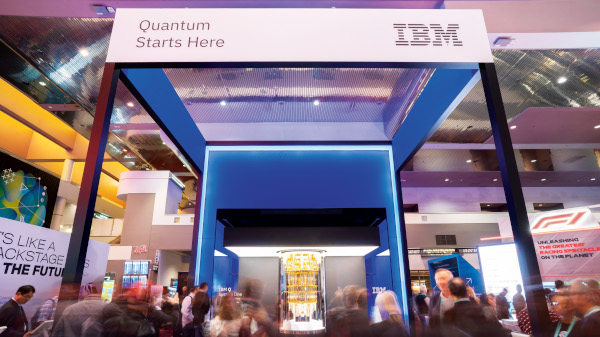Quantum mechanics is the science dealing with the behavior of matter and light on an atomic and subatomic scale. In quantum computing, a qubit is a unit of information, a parallel to the conventional bit as the smallest unit of data. It can be set to one of two states — 0 or 1 — but unlike a bit or a semiconductor gate it’s not as simple as being on or off. Three quantum mechanical properties — superposition, entanglement and interference — can manipulate the state of a qubit.
Superposition allows a quantum system to be in multiple states at the same time. A qubit can be both 0 and 1 simultaneously, until the time it is observed or measured. Unfortunately, once a superposition state meets with a measuring system it loses its in-between state in what's known as decoherence and becomes a classical bit reverting to either 1 or 0. Thus, building a quantum computer requires holding an object in a superposition state long enough to carry out various processes.
Superposition allows quantum computers to consider many variables instantaneously. Interference enables a quantum computer to combine its multiple calculations and probabilities into one answer.
An important use of quantum entanglement is teleportation. Here, the state of one qubit is destroyed in one place and resurrected in another. Entanglement behaves like there is communication between the qubits over a distance. It’s not quite “two qubits to beam me up, Scotty” but even Einstein couldn’t fully come to grips with how the measurement of one particle will instantly influence another particle, regardless of how far apart they are. Einstein described quantum entanglement as “spooky action at a distance.”
Big tech companies like Google, IBM, Intel and Microsoft are working on quantum computers. At CES 2020, IBM hosted a Quantum Tech SuperSession with Daimler AG and ExxonMobil executives discussing how it will radically change the world. IBM’s Q Network now tops 100 organizations working toward business and science applications.
Quantum computing may help solve some of the world’s most complex challenges via systems that exceed our most powerful supercomputers. Some problems that IBM is working on include:

IBM’s device is a 20-qubit quantum computer enclosed in an airtight glass case, where qubits are stable enough to perform continuous commercial quantum computations. Potential applications include:
However, it will be decades before consumers can purchase their own quantum computer. That said, the quantum computing market is projected to grow solidly through the next decade. According to Tractica’s global market forecast, total enterprise quantum computing market revenue will reach $9.1 billion annually by 2030.

I3, the flagship magazine from the Consumer Technology Association (CTA)®, focuses on innovation in technology, policy and business as well as the entrepreneurs, industry leaders and startups that grow the consumer technology industry. Subscriptions to i3 are available free to qualified participants in the consumer electronics industry.